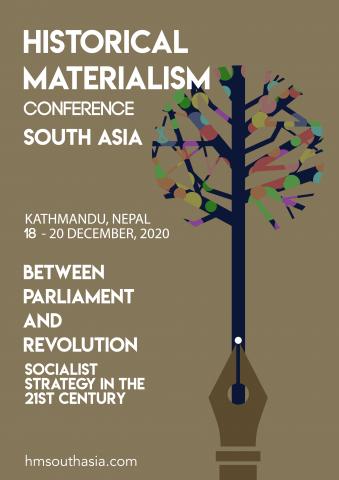
Between Parliament & Revolution
socialist strategy in the 21st century
18-20 December 2020. Kathmandu, Nepal
CALL FOR PAPERS
The Left in South Asia now has over one hundred years of experience. Freedom fighters crossed imperial borders to combine Marxism with other revolutionary ideologies with their own traditions of struggle, forming cells, groups and parties to combat empire. Memories of these anti-imperialist struggles continue to inspire today. Indeed, over one hundred years, communists in South Asia have organised millions of workers, peasants, women and other oppressed groups, building organisation and administration to parallel and even rival that of the state. They have sought and at times achieved governmental power at national and subnational levels through people’s wars, elections and even coups.
Yet, their experiences in and out of power appear to have resulted less in hopeful advances and more in a series of ambiguous impasses and even reversals. The Left has been unable to fulfil the promise of national self-determination leading to a socialist and internationalist sub-continent. In-stead, fascists and chauvinists appear to hold governments hostage even where they do not hold governmental power. Those sections of the ruling classes that are not explicitly majoritarian have little to offer by way of alternatives to more neoliberal austerity, with no promise of productive and dignified employment, while reproducing exclusionary structures of ethnic, caste/racial and gender oppression. All this in the context of climate destruction so severe that it disrupts the glaciers, the rivers, the seas—the very monsoon—and with them, exacerbates the crisis of proletarian and peasant lives and livelihoods. Even breathing has a heavy cost in the smog-ridden cities of the sub-continent.
This conjuncture calls for a reappraisal of the theory and practice of the Left in South Asia, at once attuned to the specificities of its diverse peoples and lands, and yet open to the insights of comparative analysis. In this vein, we invite debates on, but not limited to, the following themes, focused not only on South Asia but also on the Global South in general:
- Left strategy between parliament and revolution
- Modes of production, capitalist transition and class analysis in the twenty-first century
- Changing forms of labour and exploitation, digital labour, immaterial labour
- Theorising the state, sovereignty and political order
- Imperialism and expansionism: geopolitics and accumulation on world and regional scales
- Labour and popular struggle
- Borders, (forced) migration and citizenship
- Climate and environmental crisis
- Caste and community
- Patriarchy: origins, reproduction, changing shapes
- Social reproduction
- Regionalism and the national question
- War, conflict and violence
- Fascism, majoritarianism, and populism
- Culture, cultural production, and cultural labour
- Religion as a site of struggle
- Contemporary strategies for narrowing down the class gap
- Implications of technological changes in the world power
- Lessons learned from the USSR, China, Cuba, North Korea, Chile, Greece, Venezuela, Bo-livia, Peru, Indonesia, France, Brazil among other countries in relation to working mass strategies regarding the revolution and counter revolution
- Relevance of Marxism for liberating the working masses in the industrialised and least-industrialised countries and needs for updating it
Paper proposals of up to 250 words and/or self-organised panels (limited to 4 participants per panel) of up to 250 words per participant (in addition to a brief description of the panel) can be submitted here.
DEADLINE FOR SUBMISSIONS: 24 APRIL 2020
Submission in English or Nepali accepted. Translators are available for Nepali speakers.
